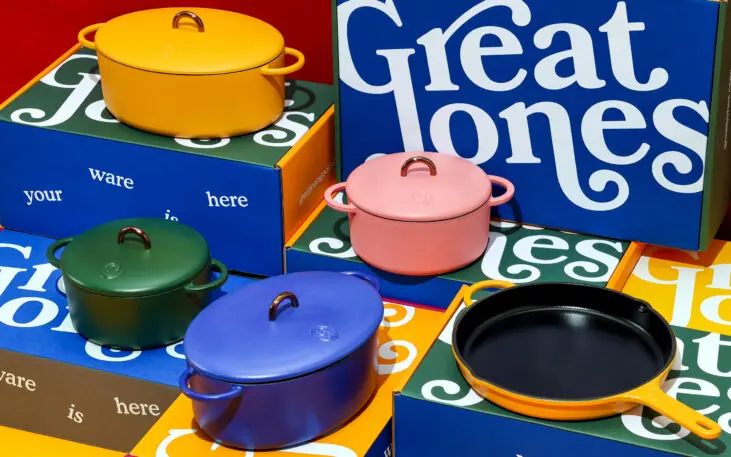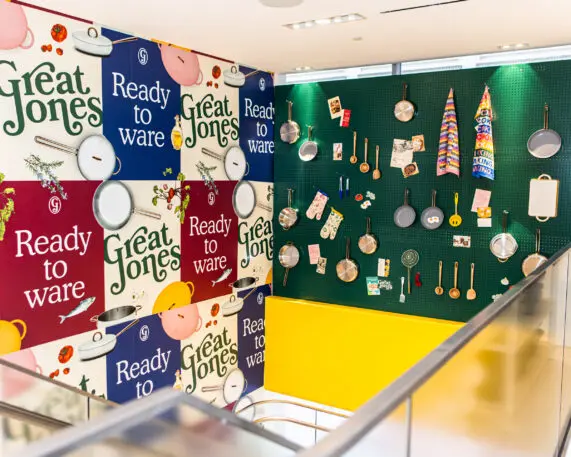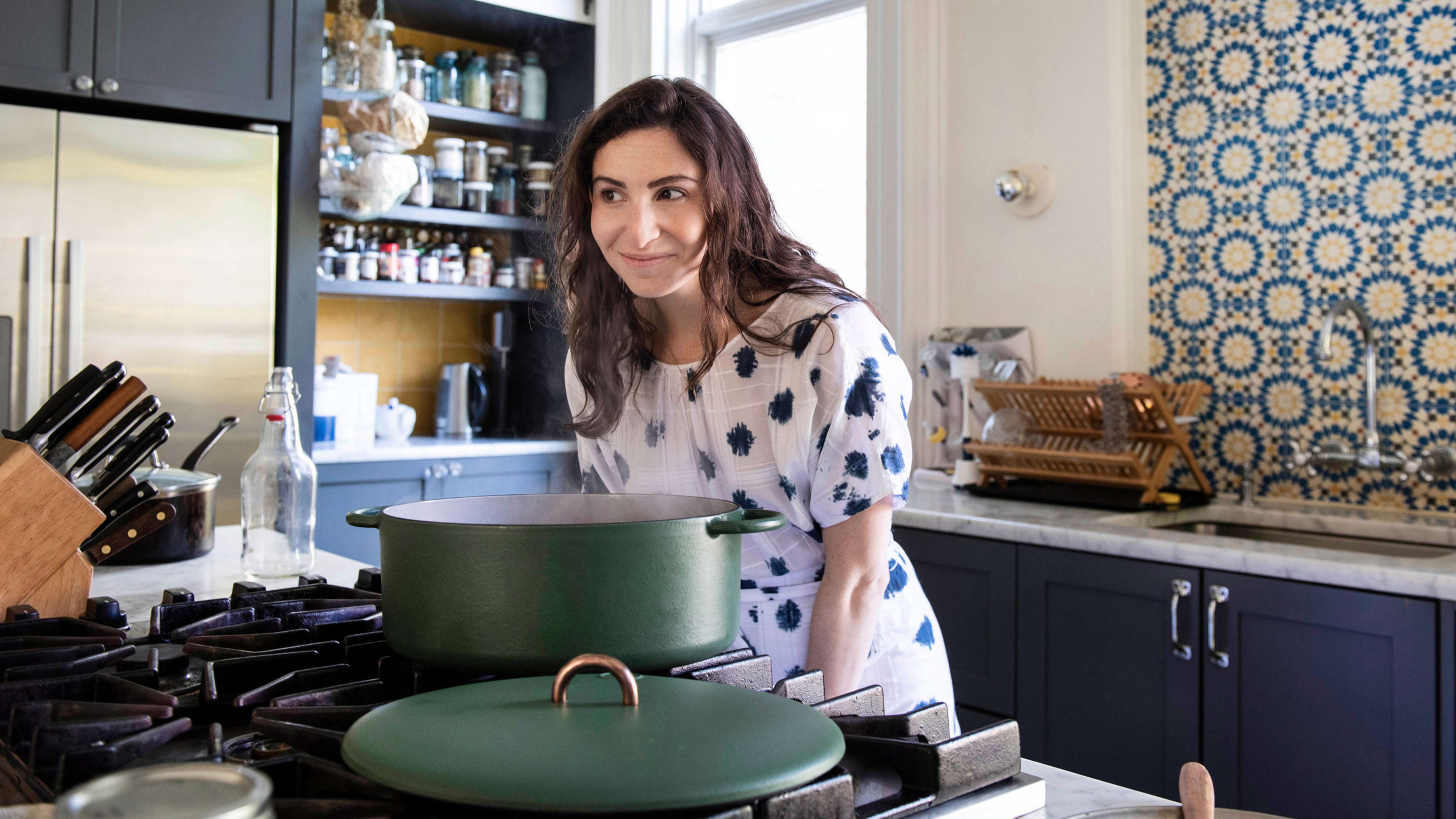Five-year-old instagram-friendly cookware brand Great Jones is getting acquired by one of its investors and suppliers, the manufacturer and distributor Meyer Corporation. The company’s six employees will stay on, and cofounder and CEO Sierra Tishgart is staying on as CEO and becoming Meyer’s executive creative director.
Great Jones will join Meyer’s family of brands that includes Farberware, Anolon, Hestan, Circulon, and Rachael Ray. “We’ve gotten to know Meyer for several years now,” Tishgart tells me, “and it’s really exciting to have a partner that I feel like can secure our company’s longevity and help us grow.”
The acquisition comes at a time when many consumer goods companies are struggling to raise capital and need to find other ways to stay alive. “For consumer goods startups,” Tishgart says, “the VC landscape has changed dramatically. A lot of VCs were treating consumer businesses like tech businesses before, and fundamentally they’re different. In making a physical product, you can scale fast and you can grow, but ultimately making something consistently that is really high quality is not as scalable as a piece of tech.”

Great dish
When Great Jones launched in 2018, it first found success on Instagram. Its brightly-colored $160 Dutch Oven, called “The Dutchess,” could be seen in the kitchens of the celebrities that it courted inside and outside the food world. Stars featured on its blog, named Great Ones, include PEN15 actor Maya Erskine, singer Kelis, and the writer Roxane Gay. The brand also produced buzz-worthy streetwear-style “drops” by collaborating with the likes of fashion brand Lisa Say Gah! and entrepreneur Meena Harris.
Great Jones also marketed itself as a more affordable version of legacy brands like Le Creuset or Staub. A Staub “deep oven,” for example, is $370 at Williams-Sonoma compared with Great Jones’s offering at less than half the price. That helped Tishgart position the company towards early-career customers making low salaries but dreaming of something more.

The pandemic boosted sales: Customers stuck at home, scrolling on their phones, were eager to purchase cookware as Instagram-friendly as the Alison Roman recipes they were attempting. But the company was plagued with supply-chain issues, leaving some products sold out for long periods of time. It also suffered from some internal turmoil, with cofounder Maddy Moelis leaving in August 2020.
By the time Tishgart needed more cash to grow Great Jones, the market had cooled, creating a challenging climate for her and other relatively early-stage, tech-forward consumer startups to be dependent on outside investors. Although Great Jones had raised approximately $8 million from name-brand individual and institutional investors such as chef David Chang and the VC firm General Catalyst, the downturn in tech and investing that started in late 2021 has particularly affected consumer goods startups. VCs came to realize that they were unlikely to see massive returns from businesses that deal with physical things. Amid that bleak VC outlook, Tishgart started to think about other ways to keep her business alive for the long-term.
She’s candid when asked about what influence taking venture financing may have had on the direct-to-consumer sector, noting that venture capitalists’ implicit demand for growth at all costs in a short amount of time ultimately did not set consumer goods businesses up for success in the long run. “The VC expectations have shifted a lot recently from ‘just grow revenue as quickly as you can and don’t worry about profitability’ to meeting that profitability goal soon,” Tishgart says. “It’s a necessary correction in the market.”
Details of the acquisition have not been disclosed and given that Meyer is privately held, they likely never will. When asked about how investors made out in Great Jones’s sale to Meyer, Ariel Kaye, who was a member of Great Jones’s board and is founder and CEO of the home goods brand Parachute, says, “I will speak on behalf of myself as an investor and a board member. I think they have found an incredible home with one of the most established cookware players.”

Joining the Meyer family
Although the company is now a subsidiary of Meyer, it will still operate as a standalone brand, with a grand vision of making everything in your kitchen. Tishgart had been moving her company in this direction since her 2020 expansion into bakeware. The Meyer acquisition will help: According to Tishgart, it owns hundreds of patents that the brand can take advantage of and it has a robust supply chain, making it easier to design and launch new products.
Tishgart also expects Meyer to help Great Jones expand its distribution. She had already expanded into physical retail; her cookware is available at Nordstrom and Sur La Table. “Ultimately, we’re asking, ‘How do you ensure people know you exist?” Tishgart says, adding, “Retention is really strong for us, so once they love the product, they come back. Getting it in stores is really compelling in terms of customer conversion.”

Back to the future
In the 2010s, a new group of startups promised to disrupt old industries by selling mundane consumer goods directly to consumers. Warby Parker helped ignite the trend, and seemingly no household good or personal item would go untouched in those heady years, from toothbrushes to mattresses. The selling point of the direct-to-consumer model was that, by avoiding markups that come from being sold in traditional retail—particularly big-box stores, items could be priced lower and savings could be passed on to customers.
Over time, as brands (including Warby Parker) realized the value in having their own stores or being able to be discovered in the aisles of a Target or Nordstrom, the distinction between these upstarts got fuzzy. As my colleague Liz Segran wrote earlier this year, the era of direct-to-consumer brands is over. There’s already a new crop of consumer startup founders approaching their companies with a different approach than the one that defined the last decade.
By becoming a subsidiary of Meyer, Great Jones, like others before it and surely others to come, has turned into what it defined itself against for so long: a legacy brand in a big-box retailer. But perhaps that was all part of the plan, “Great Jones being more than a DTC company has always been a part of our vision — specifically, “building a 100-year-old heritage brand” is one of our key long-term goals,” Tishgart says.
Recognize your brand’s excellence by applying to this year’s Brands That Matter Awards before the early-rate deadline, May 3.
